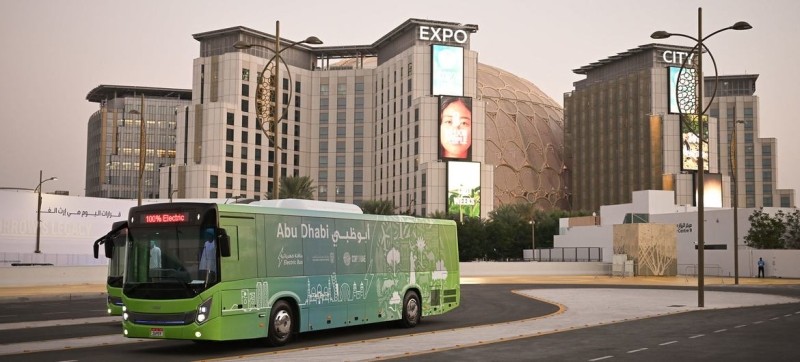
COP28/Anthony Fleyhan Shot of a 100% electric bus near Expo City in Dubai, United Arab Emirates, during the COP28 UN Climate Change Conference in 2023.
Opening its High-level Meeting on Sustainable Transport, Assembly President Dennis Francis urged countries to seize the opportunity to shape a green, inclusive and prosperous future for today and generations to come.
“From public transport to maritime transport, we must embrace innovation-driven approaches – to make sustainable transport a reality for all,” he said.
Ensure equal access
He stressed that with over one billion people, roughly one-eighth of the planet, lacking access to all-weather roads, “our foremost priority must be to ensure equal access to sustainable transport, particularly for countries in special situations and vulnerable communities.”
He drew attention to Landlocked Developing Countries, Small Island Developing States, and Least Developed Countries and the obstacles to sustainability they face, such as inadequate infrastructure, lack of maintenance capabilities and impaired resilience to climate change.
Negatives and positives
Mr. Francis urged governments to embrace innovation-driven approaches to make sustainable transport a reality, which also includes honestly confronting negative impacts such as greenhouse gas emissions, a rise in road traffic accidents and exorbitant maritime logistics costs.
At the same time, the myriad benefits should not be overlooked, he added.
“Consider, for instance, how improving access to sustainable transport can considerably enhance school enrolment rates, especially amongst the most impoverished and vulnerable – including girls and economically disadvantaged learners, in far-flung rural and remote areas plagued by unreliable and costly forms of transportation.”
Running on fossil fuels
In an increasingly interconnected world, transport and mobility can change lives for the better, said the head of the UN’s Department of Economic and Social Affairs, Junhua Li.
However, fossil fuel use still dominates the sector. More than 95 per cent of its energy comes from petroleum products, and transport also accounts for nearly a quarter of global greenhouse gas emissions.
“Other pollutants from transport, most obviously in cities, directly impact the health of people. Increasing efficiency, reducing fossil fuel use, and investing in public transport must be at the top of our transport actions,” he said.
Last year, the UN General Assembly declared 26 November as World Sustainable Transport Day in a resolution put forward by Turkmenistan.
Effective and sustainable transport
Chakyyev Mammethan, Director General of the Agency for Transport and Communications, spoke of projects both at home and in conjunction with other countries.
They include modernizing the national railway infrastructure, building highways, and establishing transport corridors with countries such as Afghanistan, Azerbaijan, Georgia and Uzbekistan to support international trade, economic development and growth in the region.
“All these initiatives really show that we have a comprehensive sustainable approach to developing our transport systems in Turkmenistan. We’re striving not only to be effective, but also to have a sustainable, responsible future,” he said.
The High-level Meeting on sustainable transport is part of the UN General Assembly’s first-ever Sustainability Week, which runs through Friday. Other issues being discussed include debt sustainability and socioeconomic equality, tourism, and energy.

